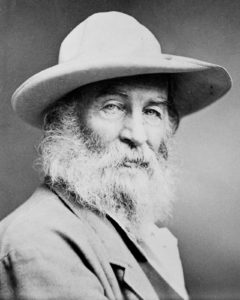We have decided to create the most comprehensive English Summary that will help students with learning and understanding.
Animals Summary in English by Walt Whitman
Animals by Walt Whitman About the Poet
Walt Whitman (1819-1892) is a major figure in early American poetry. He broke the tradition of rhymed and metrical poetry. He was famous for writing a revolutionary new kind of poetry which was in free verse. The poem ‘animals’ is from his work ‘Song of Myself’ in Leaves of grass.
| Poet Name | Walt Whitman |
| Born | 31 May 1819, West Hills, New York, United States |
| Died | 26 March 1892, Camden, New Jersey, United States |
| Poems | Song of Myself, Leaves of Grass, Song of the Open Road |
| Awards | Golden Kite Award for Picture Book Illustration |

Animals Summary in English
Having fed up in the company of human beings, the poet wants to turn his way and live with animals. He finds the animals peaceful and satisfied. They don’t have any feeling of repentance. They don’t have any lust or greed. They have nothing to do with material things.
There is complete equality among animals. They do not have any hierachy. Animals don’t need to bow down before others. Poet feels that the traits of human being like truthfulness, honesty, commitment, loyalty, purity, innocence etc. have now passed on to the animals. He wonders how these qualities have passed on to the animals. Did he negligently drop all these qualities and animals acquired them?
Animals Summary Questions and Answers
1. I stand and look at them long and long.
They do not sweat and whine about their condition
a. ‘They’ in the above lines are ……………….
(i) human beings
(ii) animals
(iii) the poets
(iv) the audience
Answer:
(ii) animals.
b. The author keeps looking at them for long because he ………………..
(i) never finds them unhappy or dissatisfied
(ii) finds them calm and peaceful
(iii) feels more at home with them
(iv) all of the above
Answer:
(iv) all of the above.
c. They are unlike human beings who are ………………..
(i) always complaining
(ii) calm and quiet
(iii) contented
(iv) not prone to anger
Answer:
(i) always complaining.
2. So they show their relations to me and I accept them.
They bring me tokens of myself, they evince
them plainly in their possession.
a. In the above lines ‘they’ stand for …………………..
(i) listeners
(ii) audience
(iii) animals
(iv) viewers
Answer:
(iii) animals.
b. The author feels related to them as they remind him of ……………………
(i) his ego.
(ii) the basic qualities of his nature.
(iii) inhuman characteristics.
(iv) his greed.
Answer:
(ii) the basic qualities of his nature.
c. They seem to possess those qualities which man has chosen to ………………..
(i) ignore
(ii) deny
(iii) drop
(iv) All of the above
Answer:
(iv) All of the above.
3. So they show their relations to me and I accept them,
They bring me tokens of myself they evince
them plainly in their possession.
a. The speaker accepts that
(i) animals are better than men.
(ii) animals are his best friends.
(iii) there is a close relation between man and animal.
(iv) all of the above.
Answer:
(iv) all of the above.
b. By ‘tokens of myself the speaker means
(i) animals are like men.
(ii) coins dropped by the speaker.
(iii) they remind him of the basic values of the human beings.
(iv) the marks of animal’s goodness.
Answer:
(iii) they remind him of the basic values of the human beings.
c. Animals have the ‘tokens’ dropped by man.
(i) retained and preserved
(ii) searched
(iii) robbed
(iv) lost
Answer:
(i) retained and preserved.
4. I think I could turn and live with animals, they are so placid and self-contain’d,
I stand and look at them long and long.
a. The poet wants to live with the animals because they are …………….
(i) calm
(ii) self-contained
(iii) satisfied
(iv) all of the above
Answer:
(iv) all of the above.
b. The poet feels more at home with animals than
(i) birds and insects
(ii) human beings
(iii) natural things
(iv) all of the above
Answer:
(ii) human beings
c. The word which means ‘calm and quiet’ is
(i) placid
(ii) complex
(iii) groan
(iv) contented
Answer:
(i) placid
5. They do not lie awake in the dark and
Weep for their sin ……………
Question 1.
Who are ‘they’? How are they different from human beings?
Answer:
They’ here refers to the animals. They are different from human beings as they do not sweat and whine about their pathetic condition. Animals do not feel guilty for their actions so they need not awake in the dark and weep for their sins.
Question 2.
‘Not one is respectable or unhappy Over the whole earth.’
Who is the poet talking about? What is their state of mind?
Answer:
The poet is talking about the animals. They are placid and self contained. They are not worried about getting respect or disrespect as they have no ego.
Question 3.
‘They do not make me sick discussing their duty to God’
Who are ‘they’? What makes him sick?
Answer:
They’ are here the animals. The discussions about subjects of philosophy or religion which the animals do not indulge in make him sick.